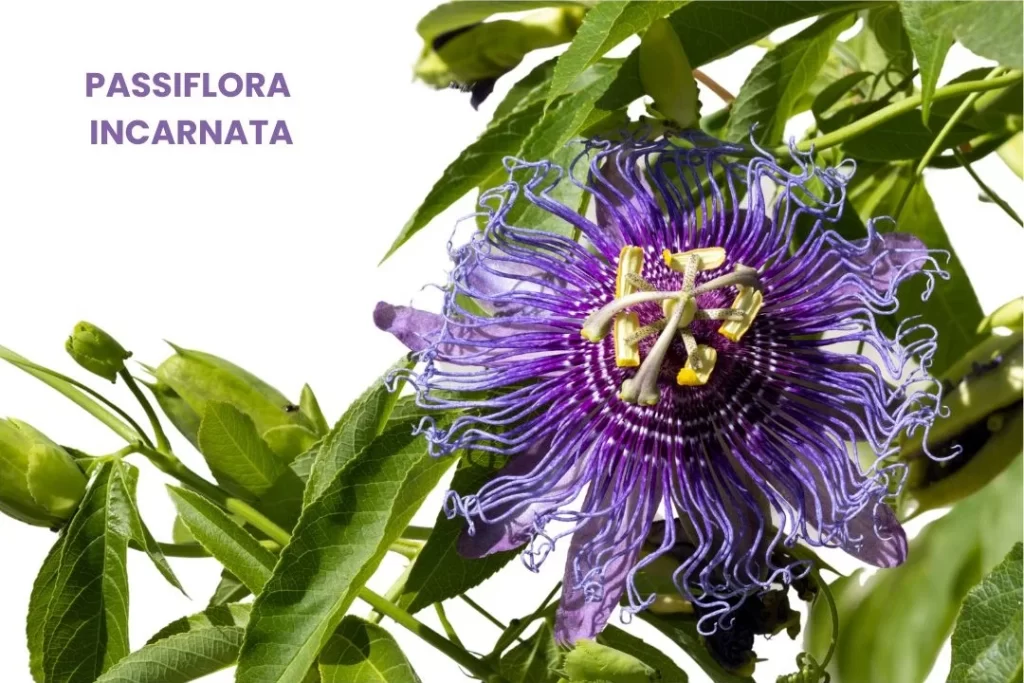Passiflora incarnata, commonly known as Passion-flower, is a well-regarded remedy in homeopathy and herbal medicine. It is particularly valued for its calming and anti-spasmodic properties.
The plant is native to the southeastern United States and has a long history of use for its therapeutic benefits, especially in addressing nervous system disorders.

Table of Contents
ToggleDETAILED SOURCE INFORMATION
Scientific Classification
- Kingdom: Plantae
- Clade: Angiosperms
- Clade: Eudicots
- Order: Malpighiales
- Family: Passifloraceae
- Genus: Passiflora
- Species: incarnata
Origin and Historical Facts
- Native Region: Passiflora incarnata is native to the southeastern United States but is also found in other parts of the Americas.
- Historical Usage: Native Americans utilized the plant for various medicinal purposes, such as treating wounds, boils, and liver problems.
- The European settlers adopted its use and found it particularly effective for its sedative and anti-spasmodic properties.
- Introduction to Medicine: In the late 19th and early 20th centuries, Passiflora incarnata gained prominence in Western medicine as an effective remedy for insomnia, anxiety, and nervous disorders.
DRUG PATHOGENESIS
Passiflora incarnata affects the nervous system, gastrointestinal tract, and respiratory system.
It is primarily used for its calming effects, making it useful in treating conditions involving spasms, convulsions, and nervous tension.
KEY CHARACTERISTICS AND SYMPTOMS
NERVOUS SYSTEM
- Calming Effect: It has a soothing effect on the nervous system, making it beneficial for treating conditions like whooping-cough, delirium tremens, convulsions in children, neuralgia, and hysteria.
- Insomnia: It induces normal sleep without disturbing cerebral functions, making it suitable for insomnia in infants, the elderly, and individuals who are mentally overworked or worried.
- Convulsions and Spasms: Effective in treating spasms, convulsions, tetanus, and puerperal convulsions.
GASTROINTESTINAL SYSTEM
- Diarrhea: Useful in treating painful diarrhea, often associated with a general atonic condition (lack of muscle tone).
- Stomach Discomfort: Symptoms include a leaden, dead feeling after or between meals, flatulence, and sour eructations.
RESPIRATORY SYSTEM
- Whooping-Cough and Asthma: Effective in managing whooping-cough and asthma.
- For asthma, large doses (10-30 drops every ten minutes for a few doses) can provide relief.
- Nocturnal Cough: Helps alleviate nighttime coughing, particularly in infants and the elderly.
HEAD
- Headache: Violent headaches characterized by a sensation as if the top of the head would come off, and eyes feeling as if pushed out.
SLEEP
- Insomnia: Especially useful for those who are restless and wakeful due to exhaustion, including infants, the elderly, and mentally stressed individuals.
LOCAL APPLICATIONS
- Erysipelas: Passiflora can be used topically for erysipelas (a bacterial skin infection) due to its soothing properties.
MODALITIES
- Better: Generally, improves with rest and sleep.
- Worse: Symptoms may worsen with mental exertion and stress.
WHAT ARE MODALITIES IN HOMOEOPATHY?
RELATIONSHIP WITH OTHER DRUGS
- Compare: Other remedies for nervous conditions and insomnia include Valerian, Hyoscyamus, and Coffea.
- Complementary: Can be used alongside other sedative and anti-spasmodic remedies.
DOSE
- Tincture: Large doses of the mother tincture (30-60 drops) are often required, repeated several times a day.
- Potency: The use of tincture is preferred for its efficacy in acute cases, especially for its sedative effects.
Frequently Asked Questions
What is Passiflora incarnata used for?
- It is primarily used for treating nervous system disorders, insomnia, convulsions, spasms, and gastrointestinal discomfort.
Is Passiflora incarnata safe?
- When used under the guidance of a qualified homeopath or herbalist, it is generally considered safe.
- However, it is important to adhere to the recommended dosages to avoid any potential side effects.
How does Passiflora incarnata help with insomnia?
- Passiflora incarnata induces normal sleep without disturbing cerebral functions, making it effective for treating insomnia, especially in infants, the elderly, and individuals with mental stress.
Can Passiflora incarnata be used for children?
- Yes, it is particularly useful for treating convulsions, spasms, and insomnia in children, making it a valuable remedy for pediatric use.
Glossary of Difficult Words
- Antispasmodic: A substance that suppresses muscle spasms.
- Delirium Tremens: A severe form of alcohol withdrawal involving sudden and severe mental or nervous system changes.
- Convulsions: Involuntary contractions or series of contractions of the voluntary muscles.
- Atonic: Lacking normal muscle tone or strength.
- Erysipelas: A bacterial infection in the upper layer of the skin.
- Insomnia: Difficulty falling or staying asleep.
Passiflora incarnata is a versatile remedy, particularly effective for various nervous system disorders, insomnia, convulsions, and gastrointestinal issues.
Its calming and anti-spasmodic properties make it a valuable addition to the homeopathic and herbal pharmacopeia.
